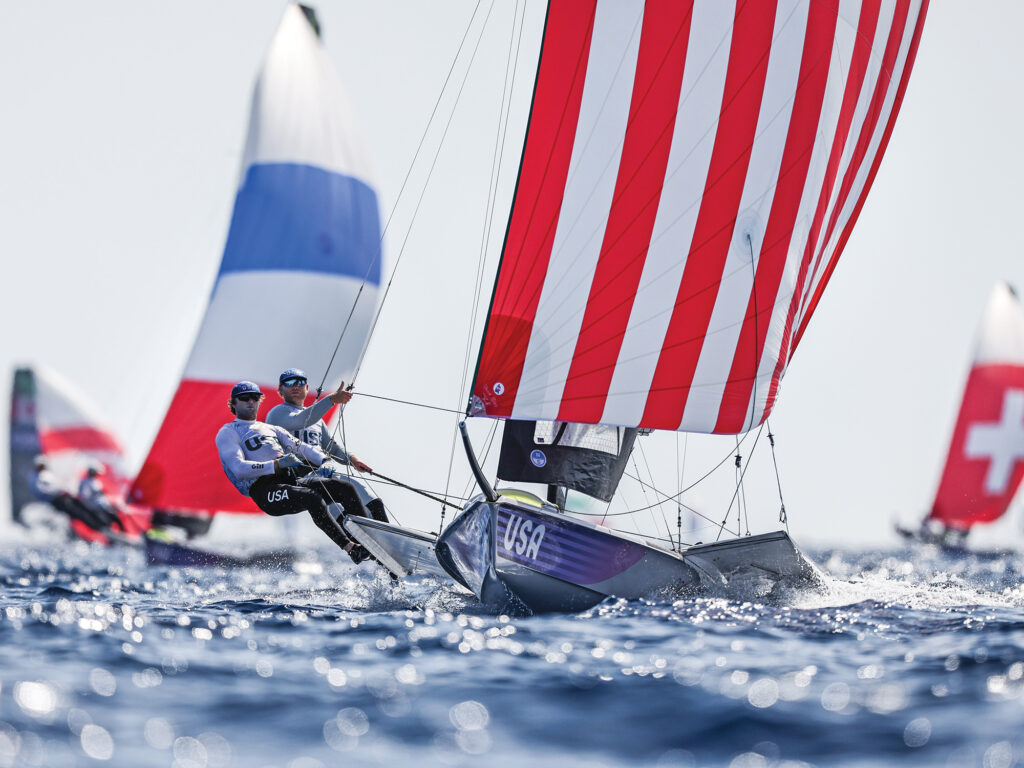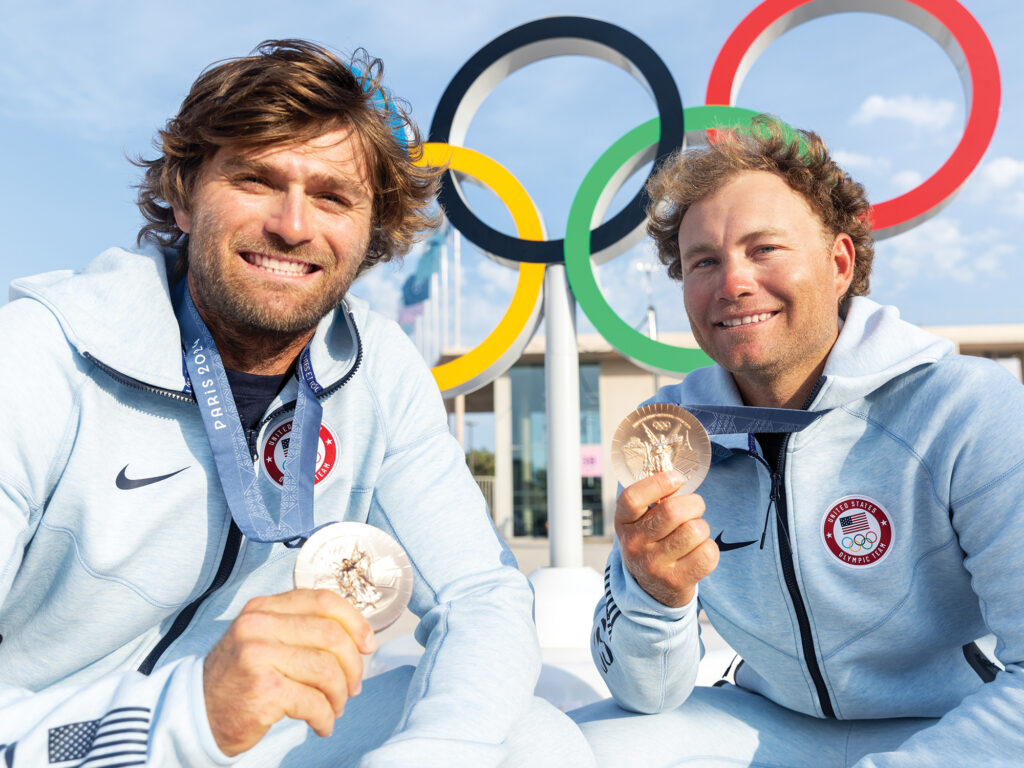Henken and Barrow’s Olympic Moment
 The Olympic racecourses off Marseille were as challenging as expected, with light and shifty conditions prevailing for the duration of the regatta. Skipper Ian Barrows and crew Hans Henken persevered to the medal race to secure their bronze medals.
World Sailing/ Sander van der Borch
The Olympic racecourses off Marseille were as challenging as expected, with light and shifty conditions prevailing for the duration of the regatta. Skipper Ian Barrows and crew Hans Henken persevered to the medal race to secure their bronze medals.
World Sailing/ Sander van der Borch
On the afternoon on Friday, August 2, Ian Barrows and Hans Henken became a part of sailing history by winning the bronze in the Men’s Skiff class for Team USA in the Paris 2024 Olympic Games—and the US Sailing Team’s first medal from Marseille. What makes this bronze medal even more sensational is the simple fact that no one has achieved that feat for the United States in 24 years. Receiving their medals was just one flash of a moment in time; behind that moment, however, was a lifetime pursuit.
An Olympic sailing campaign is no easy undertaking. There are countless hours of traveling, logistics, practicing and competing, all of which leads to a four-day regatta that is capped by a single, high-pressure double-points medal race. The sailors have to be ready for anything, and that was exactly what Barrows and Henken were. It was a roller-coaster ride for the Men’s Skiff class as Marseille dished out a variety of conditions for the sailors to master.
When they arrived in Marseille, Barrows and Henken knew that it was going to be a tough event, and their game plan was simple—to be consistent. They had spent several months over the past two years getting ready to compete in Marseille, learning the venue and winds that range from whispers to near gales. In a regatta with only one discard race allowed, being able to log consistent “keeper” scores was the priority.
Over the four-day medal-race qualifying series, as expected, they experienced a wide range of conditions. Light and shifty winds on the first day finally built to a steadier, but still light, breeze by the third and final race of the day. Barrows and Henken were struggling a bit on the starts, but they found themselves in prime positions to stage a few impressive comebacks for the first two races of the day. The third race was looking like a repeat of the first two, but after a weather-mark penalty and turns, they finished 17th. It was a tough end to a long and hard first day of racing, and Barrows considers that port/starboard foul to be their biggest mistake of the regatta. Thanks to their pursuit of consistency, however, the 17th would become their dropped score. After Day 1, the pair were sitting in 12th overall, just outside the coveted top 10.
The second day was also light, hot and sunny, but the breeze direction was much steadier, making it a shorter, more conventional day of racing for the racers. They added more emphasis on being able to get better starts, which finally came to fruition on the last race of the day and a fifth-place finish. This brought Barrows and Henken up to sixth overall, and the relief and excitement were easy to see on their faces as they sailed back to the marina, waving to all the fans on the seawall.
 US Sailing Team members Hans Henken and Ian Barrows capped a long and arduous campaign with bronze medals in Marseille, the reward of a long and arduous campaign.
World Sailing/ Lloyd Images
US Sailing Team members Hans Henken and Ian Barrows capped a long and arduous campaign with bronze medals in Marseille, the reward of a long and arduous campaign.
World Sailing/ Lloyd Images
The leaderboard had a big shake-up on Day 3, with waves and extremely erratic winds blowing down from the nearby mountains. Barrows and Henken thrive in such challenging conditions and felt prepared thanks to the amount of time on the water and training that they had put in leading up to the Games in the same wind direction. They were finally on form, scoring a 10, 7 and 3. Their third-place finish was nearly a first, but they got unlucky at the bottom of the last leg, finding themselves in a lull trying to get enough momentum to cross the finish line.
Undeterred by losing out on a potential first-place finish, Barrows and Henken carried their upward momentum into the last day of racing in the qualifying series. Sitting in fifth overall to start the day, the American duo scored their best finish yet: a second. At the conclusion of the qualifying series, they were fourth overall—just 4 points behind the New Zealand team in third; 7 points out of second, held by the Irish; and 12 points behind the Spanish leaders (and eventual gold medalists), Diego Botin and Florian Trittel.
The medal-race day in the Olympics comes with additional ceremonies and a big change for the sailors because they have to appear at a finalist presentation before rigging their boats in a “pit lane” in the spectator venue in front of the crowd. The atmosphere on this August day was loud, the crowd packed with fans, friends, and families cheering and waving flags, a scene completely different from the normal seclusion of the marina.
Barrows says that the medal-race morning was the first real time that it felt like he was at the Olympics, that it felt like a really big deal. The two sailors knew the enormity of the moment, and after finding their friends and family to give a final wave, they launched their 49er and made their way to the course for the race. Mother Nature had a different plan. The breeze was light and dropped to unsailable conditions, not once but twice, saving the pair from two potentially disastrous races and well out of medal contention. Racing was abandoned—a nerve-wracking dress rehearsal for the sailors.
A second attempt at the medal race the following day was much more promising, with a steady 7-to-10-knot sea breeze. After a strong start and a stroke of good luck with three boats being over the line early, Barrows and Henken enjoyed a healthy lead on the Irish team and were in the leader pack with the runaway Spanish team and the New Zealanders. All they needed to do to secure the bronze medal was to put three boats between themselves and the Irish, and that was exactly what they did.
“Our whole Olympics, we kept building and building toward the medal race,” Henken says. “In a way, it’s how our whole campaign played out. Each day, month, year of our journey, we continued to build, learn and improve. We never let setbacks, or results, define our ability to sail. We set clear goals and peaked at very key moments throughout. In the end, it all came down to execution, and that’s how we would define our medal-race performance: precise execution at the highest level.”
Barrows shares a similar perspective. “We’ve put a lot of effort into peaking at this regatta,” he says. “I think we did a really good job of improving our speed and starting throughout the event. Our goal was to have a chance at a medal going into the medal race, and we had a great game plan going into the medal race and executed it well. Luckily, things went out with the Irish being over the line. We feel very lucky and honored to have won the medal for the United States.”
It was a once in a lifetime moment built on a lifetime of moments in preparation and something the two sailors say they will never forget. They are proof that no matter what happens, what setbacks occur, if you keep pushing forward, you really can make your dreams come true. They put in 556 days of sailing to get their medals and say that every single one of them contributed something to their success.
The post Henken and Barrow’s Olympic Moment appeared first on Sailing World.
- Home
- About Us
- Write For Us / Submit Content
- Advertising And Affiliates
- Feeds And Syndication
- Contact Us
- Login
- Privacy
All Rights Reserved. Copyright , Central Coast Communications, Inc.